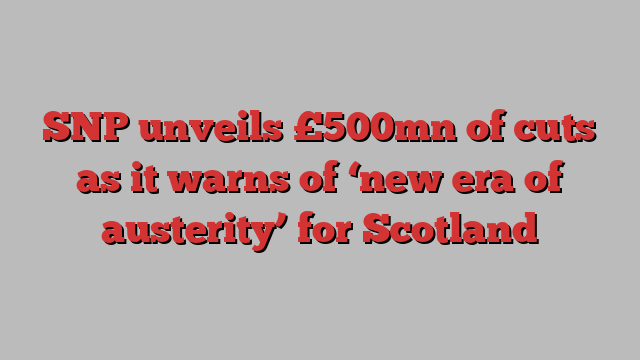
Unlock the Editor’s Digest for free
Roula Khalaf, Editor of the FT, selects her favourite stories in this weekly newsletter.
Scotland’s finance secretary has announced £500mn of spending cuts to ease “enormous pressure” on the devolved administrations’ budget, after she warned of a “whole new era of austerity” caused by the government in Westminster.
Shona Robison laid out the “emergency spending controls” across Holyrood on Tuesday, which will also include copying a Westminster policy of applying means testing to winter fuel payments for pensioners.
Robison said the government in Edinburgh would also use up to £460mn of revenue raised by leasing seabed plots to offshore wind developers “to address in-year pressures in 2024-25”.
She blamed impending spending cuts by Westminster chancellor Rachel Reeves, expected in the October Budget to help repair the UK’s parlous finances, for the need for the SNP to make reductions.
“Prolonged Westminster austerity, the economic damage of Brexit, a global pandemic, the war in Ukraine and the cost of living crisis have all placed enormous and growing pressure on the public finances,” Robison said. “We cannot ignore the severe financial pressures we face.”
But critics of the SNP’s administration in Holyrood say the party’s management of the Scottish economy and its own spending is also to blame for its need to cut costs.
Opposition parties condemned Robison’s actions, with Michael Marra, Scottish Labour’s finance spokesperson, saying the statement was a “threadbare, shameless attempt to once again pass the buck”, while Scottish Liberal Democrat leader Alex Cole-Hamilton said it was a “fiscal firestorm” that cut key NHS services.
The spending reductions announced by Robison were an attempt to meet legal requirements to balance Holyrood’s budget.
Last month, she told fellow cabinet ministers to impose emergency controls on their spending after Reeves announced cuts to welfare payments and infrastructure spending to deal with a £22bn hole in the UK’s finances.
Reeves adopted recommendations of a 5.5 per cent pay increase for the public sector — higher than Scotland’s budgeted 3 per cent rise. The Scottish government has also offered a pay increase to local council workers in a bid to settle threatened strike action.
The extent to which the Scottish government will have to fund public sector pay increases through additional funding from Westminster or through its own departmental cuts should become clearer after Reeves’ October Budget, but may not be finalised until February, the independent Scottish Fiscal Commission said last month.
Some measures have already been communicated to the public including the UK’s decision to cut winter fuel payments for pensioners, the reintroduction of peak rail fares, and less funding for the arts.
On Wednesday, first minister John Swinney will unveil the much-anticipated programme for government, outlining his legislative programme for the parliamentary year. The plan will be closely watched as a blueprint for the SNP’s attempt to recover from July’s bruising defeat in the UK elections, and to prepare to fend off a Labour bid for power at the Holyrood elections in May 2026.
On Sunday’s party conference speech, Swinney accused Labour of delivering the “same damaging austerity as the Tories” and pushing tens of thousands of children into poverty by keeping the two-child cap on benefits. He also said Labour had failed to deliver its promise of reducing energy bills.
The Fiscal Commission has said Scotland’s pressured public finances are the result of both UK policies and the Scottish government’s own decisions, such as this year’s council tax freeze and more generous pay deals and benefits.